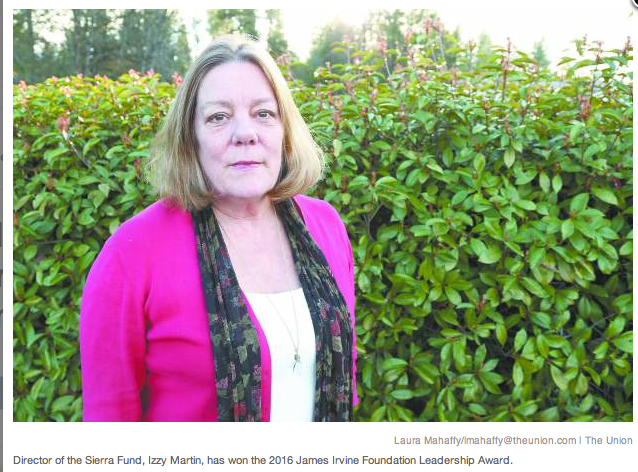“I always found the Yuba River my favorite place to be,” Martin said.
Martin now is being honored with a $200,000 award because of her efforts. She’s a 2016 James Irvine Foundation Leadership Award recipient, an honor she’ll receive today at a Sacramento ceremony.
The foundation, which last year awarded $74 million to nonprofits that benefit Californians, selects awardees based on three criteria: the significance of the issue, the innovation used to address that issue and the track record of the person’s effectiveness. “Water is such a critical issue for the state of California,” said Amy Dominguez-Arms, vice president for programs with the James Irvine Foundation. “She’s been effective at bringing together diverse stakeholders. She really rose to the top in all those criteria.”
Martin pointed to her work over the last 10 years as the main reason for receiving the award. She’s spent much of that time focused on protecting water quality in the wake of the area’s mining history. According to Martin, scientists were among the few who had concerns about water quality a decade ago. The issue hadn’t reached mainstream awareness. “But it was something that was constantly popping up,” she said.
That growing awareness led to the Sierra Fund becoming involved in projects focused on water quality. It doesn’t direct the projects it’s involved in, such as the Combie Reservoir cleanup. Instead it facilitates the effort by working with scientists on research and serving as a conduit for grant money.
Martin has literature on mercury at her fingertips. One pamphlet shows two main trouble spots — gold mines and reservoirs. Mercury can enter waterways from the mines themselves. Mercury also accumulates in sediment behind reservoirs.
“We’re working on the bigger problem,” Martin said. “The sources are still possible to identify and possible to mitigate.”
The Combie Reservoir cleanup is one project of the Sierra Fund. Martin’s group has secured money for the cleanup, which will achieve three different goals.
The obvious benefit is the removal of mercury from the reservoir. However, removing built-up sediment from the reservoir also will provide more space for water, space that’s currently taken up by the sediment. Additionally, the sand and gravel removed from the reservoir has cash value. Gold likely will be found in that silt. The gold and sediment can be sold to help mitigate the cost of the project, Martin said. “The multiple benefits of this project are incredible,” she added. Martin’s efforts to improve water quality have sparked controversy. The practice of suction dredge mining has come under attack over the past decade. Under a moratorium for years, suction dredge mining now requires permitting through state agencies.
Martin says suction dredge mining can stir up mercury. Some miners strongly disagree with Martin, though the Legislature stated the dangers of the practice in a bill passed into law by Gov. Jerry Brown. Martin argues people should be concerned about mercury in the water. Mercury collects in fish, and the people who eat them, leading to serious health issues. The Sierra Fund has spoken to hundreds of fishers, informing them of the problem. It’s also tested dirt trails,finding some contaminated with asbestos.
“Mostly what we’ve been trying to do is get people to pay attention to the threat of these legacy mines,” Martin said. “Where we live, that mercury comes from mining.”
The James Irvine Foundation received more than 200 nominations for this year’s awards. Those nominations were then whittled down to finalists, who received site visits before this year’s six awardees were announced, Dominguez-Arms said.
The award ceremony occurs at noon today at the Sheraton Grand Hotel, on J Street, in Sacramento.
The other awardees include Lenore Anderson, with Californians for Safety and Justice, of Oakland; Dr. Dean Schillinger, San Francisco General Hospital/UCSF Center for Vulnerable Populations, of San Francisco; Kate Sofis and Todd Rufo, of SFMade/San Francisco Office of Economic and Workforce Development, both of San Francisco; and Peter Weber, Fresno Bridge Academy, of Fresno.
All received $200,000, for a total of $1 million. Sofis and Rufo worked as a team.
Martin said she’ll use the money for a better computer software system and strategic planning. Part of the Sierra Fund’s mission includes recognizing and financing projects. Martin expects the upgraded software will further those goals.
“I think my love of and passion for restoring the Yuba River drives me,” Martin said. “It’s easy to say ‘What I’m doing matters.’ This one really moves me.”
CLICK HERE to see the complete article in The Union Newspaper.

 RSS Feed
RSS Feed